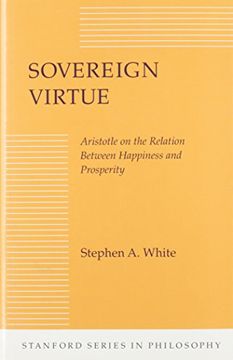Sovereign Virtue: Aristotle on the Relation Between Happiness and Prosperity (Stanford Series in Philosophy) (en Inglés)
Reseña del libro "Sovereign Virtue: Aristotle on the Relation Between Happiness and Prosperity (Stanford Series in Philosophy) (en Inglés)"
The central subject of Aristotle's ethics is happiness or living well. Most people in his day (as in ours), eager to enjoy life, impressed by worldly success, and fearful of serious loss, believed that happiness depends mainly on fortune in achieving prosperity and avoiding adversity. Aristotle, however, argues that virtuous conduct is the governing factor in living well and attaining happiness. While admitting that neither the blessings not the afflictions of fortune are unimportant, he maintains that the virtuous find life more satisfying than other people do and, with only modest good fortune, they lead happy, enjoyable lives. Combining philological precision with philosophical analysis, the author reconstructs Aristotle's defense of these bold claims. By examining how Aristotle develops his position in response to the prevailing hopes and anxieties of his age, the author shows why Aristotle considers happiness important for ethics and why he thinks it necessary to revise popular and traditional views. Paying close attention throughout to the internalist dimension of Aristotle's approach - his emphasis on how the virtuous view their own lives and actions - the author advances new interpretations of Aristotle's accounts of several major virtues, including temperance, courage, liberality, and 'greatness of soul'. This work sets Aristotle in the broader cultural context of his time, tracing his attemps to accommodate and amend rival views. The author examines literary and historical sources as well as philosophical texts, showing the inherited values and traditional ideals that inform Aristotle's discussions and provide some of the basis for his conclusions. Presupposing no knowledge of Greek or specialized philosophical terminology, the book is designed to be accessible to all students of philosophy or classical antiquity. All quotations from ancient texts are translated.

